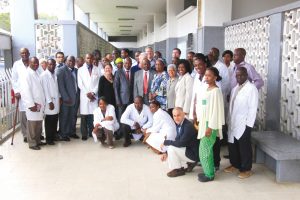
At the John F. Kennedy Medical Center in Monrovia, Liberia, health officials, doctors, residents, and medical students gathered for grand rounds on the importance of research that were presented by Mount Sinai’s OBGYN team.
After suspending travel to Liberia during the largest outbreak of Ebola in history, faculty at the Icahn School of Medicine at Mount Sinai resumed their teaching trips to the West African country last fall, with renewed efforts to improve women’s health.
Led by Ann Marie Beddoe, MD, Assistant Professor, Obstetrics, Gynecology and Reproductive Science, members of the Mount Sinai community have undertaken several initiatives in Liberia since they began working there in 2008. They are helping to train the country’s first residents in obstetrics and gynecology and have applied for a grant from the National Institutes of Health to help build a cancer center. They have also trained nurses to conduct human papillomavirus (HPV) screenings and counsel patients.
The Icahn School of Medicine and several U.S. universities, including Harvard University and Massachusetts Institute of Technology, belong to a consortium that is helping Liberia establish educational programs in basic science, radiation therapy, and pathology, as well.
The overriding goal of all of these programs is to help the country build its own sustainable, health care infrastructure, which was destroyed in two successive civil wars, the last of which ended in 2003. Following the Ebola outbreak in 2014, Mount Sinai faculty members no longer have direct contact with Liberian patients. Their trips are entirely educational.
Dr. Beddoe’s first visit to Liberia in 2008 was organized by Jeffrey S. Freed, MD, an Associate Clinical Professor in the Department of Surgery. At the time, she says there were 22 doctors serving the entire nation of 4 million people. Only one of those doctors specialized in OBGYN care. She says Mount Sinai’s involvement and the support of Michael Brodman, MD, the Ellen and Howard C. Katz Chairman’s Chair in the Department of Obstetrics, Gynecology and Reproductive Science, are helping to pave the way for Liberia’s first class of OBGYN residents to graduate in 2017.
Unlike other impoverished countries, Liberia had no health care infrastructure in 2008. “War had decimated everything,” says Dr. Beddoe, who is also Director, Chemotherapy Infusion Service, Icahn School of Medicine at Mount Sinai. One CT scan machine served the entire country and there were no ventilators. Patients who were wealthy and healthy enough traveled to nearby Ghana to receive radiation treatment. With the assistance of Eileen Solomon, Director, Special Events at the Mount Sinai Health System, who, as a volunteer, has helped facilitate 15 trips to the country, Mount Sinai has been able to make inroads.
“I saw so many women with cervical cancer who were being treated for infections. The doctors were unaware of cervical cancer,” says Dr. Beddoe. She and Peter R. Dottino, MD, Director of the Division of Gynecologic Oncology at the Mount Sinai Health System, teamed with a local doctor to initiate the country’s first chemotherapy program at the John F. Kennedy Medical Center in the capital, Monrovia, where patients were treated for free. Liberia’s Ministry of Health is planning to open a dedicated cancer hospital this year.
In an upcoming initiative, Dr. Beddoe plans to train 40 health care workers to serve as HPV specialists who will build awareness about the importance of cervical cancer screenings and early detection, when the cancer can be treated successfully. To assist in this effort, the biomedical company Qiagen has donated 2,000 free HPV screening kits and a machine that reads same-day test results. Dr. Beddoe says Mount Sinai has applied for 8,000 more tests.
“If we can get the Ministry of Health to do screenings on an ongoing basis, we know we can save women’s lives,” she says.

